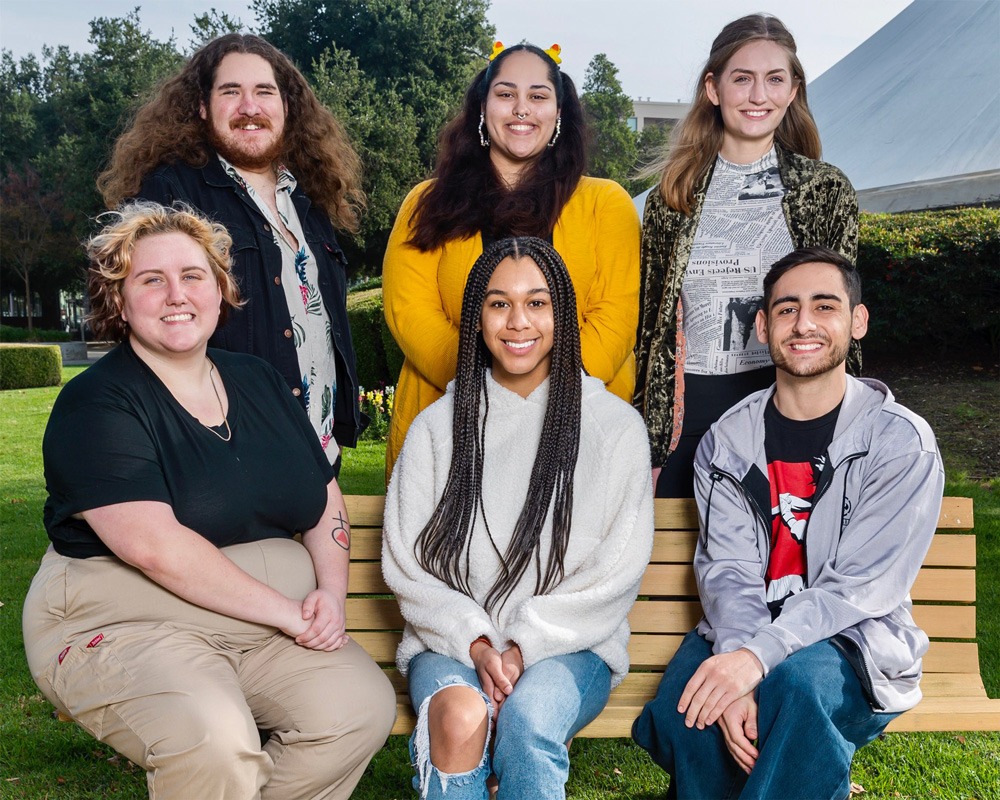The Department of Rhetoric and Communication Studies (RCS) fosters the study and practice of rhetoric, which for more than two thousand years has been defined as the study and art of persuasion. Rhetoric describes how people use language and symbols to make meaning and thus explains why individuals and groups hold the perspectives and values they do. As such, the study of rhetoric and communication is grounded in the everyday practices and understandings of people as social actors. Rhetoric and communication studies provides students with invaluable tools to better understand themselves, others, and the world around them.
Offering a major, minor, and numerous electives, the department promotes a engagement with a variety of theoretical and applied approaches to human communications, including intercultural, interpersonal, organizational, professional, and nonverbal forms of communication. RCS courses encourage students to become effective, ethical, culturally competent reflective communicators in their academic, professional, personal, and civic lives. Because of its broad applicability across industries and professions, and its integral role in virtually every human endeavor, rhetoric and communication studies remains a foundational course of study.
Our faculty are highly qualified and committed to students, and our majors are dynamic students who engage in lively class discussions and critical thinking. Both strive to understand complex human communication behavior from liberal arts and social sciences perspectives.
Outcomes
With an RCS major/minor, students will be able to
- Understand the power of language as a shaping force in human perception rather than as a neutral vehicle that transcribes reality.
- Analyze arguments and use both rhetorical and communication theory to see the complex relationship between language and the social forces of power and privilege.
- Apply aspects of relational communication, including interpersonal and intercultural knowledge and theories in everyday and professional relationships
- Critique a variety of communicative strategies and platforms. As savvy producers and consumers of media, students will be able to differentiate ethical from non-ethical communicative practices and recognize the knowledge traditions and intellectual histories from which such practices originate
- Become effective and ethical speakers and writers who can use nonverbal and verbals to create an immediacy between rhetor and audience and who apply diverse rhetorical strategies and concepts to a wide variety of deliberative situations.
La Verne Debate Team
 The La Verne Debate Team is one of the most visible and decorated student organizations on campus. It competes nationally and internationally against other heavyweight institutions like Oxford, Cambridge, Yale, Princeton, Stanford, Harvard, and more, and has traveled to more than a dozen countries around the world in its quest to make their argument heard. Founded in 1912, the University of La Verne Debate team has long held a significant presence in many different formats of debate across the world, most significantly playing a crucial role in the growth of British Parliamentary Debate in the North American debate circuit.
The La Verne Debate Team is one of the most visible and decorated student organizations on campus. It competes nationally and internationally against other heavyweight institutions like Oxford, Cambridge, Yale, Princeton, Stanford, Harvard, and more, and has traveled to more than a dozen countries around the world in its quest to make their argument heard. Founded in 1912, the University of La Verne Debate team has long held a significant presence in many different formats of debate across the world, most significantly playing a crucial role in the growth of British Parliamentary Debate in the North American debate circuit.
Since 1999, the University of La Verne Debate Team has been top ranked at two World Universities Debating Championships from this hemisphere, won the National Open, won the United States Universities National Championship, won the Americas’ Cup, and been the only American team qualifying for the elimination rounds of the World Championships. And that’s just a small sampling of their achievements; learn more if you’re interested in becoming a member of the team.
The History of Rhetoric and Communication Studies
As an academic discipline, rhetoric and communication studies traces its origins to classical rhetoric, which evolved into a prominent component of the seven liberal arts of the medieval schools. “The ability to speak clearly, eloquently, and effectively has been recognized as the hallmark of an educated person since the beginning of recorded history … In the United States, rhetorical training has been a part of formal education since Harvard’s founding in 1636.”1 During the nineteenth century, a reexamination of the rhetorical tradition began, inspired primarily by the interests of social scientists in human communication. This resulted in the formation of speech communication as a discipline incorporating the two related yet distinct areas of rhetoric and communication studies. Both areas investigate similar questions about human interaction, but they vary in the methods used to answer these questions. Rhetoric scholars utilize humanistic methods and communication studies scholars utilize social-scientific methods. Together, they pursue the study and practice of human communication.
Rhetoric and Communication Studies today
Rhetoric and Communication Studies scholars explore the creation of social realities, the nature of verbal and nonverbal signs and symbols, and the role of communicative behavior in a variety of social contexts (including personal relationships, organizations, intercultural encounters, political and legal debates, and beyond).
As specific areas of study, rhetoric and persuasion emphasize communication in the contexts of debate, public address and discourse, political and legal communication, and even social influence attempts in sales, personal relationships, and work relationships. Interpersonal and intercultural communication recognize the role of communication in the development, maintenance, and deterioration of relationships, including personal, work, and stranger relationships, and relationships across cultures. Organizational and group communication is the study of information flow within an organization, between the organization and the external environment, and among groups.
Most academic training in the area of speech communication takes the perspective that successful communication is partly a learned skill. Most people are born with the physical abilities to acquire necessary communication tools, but such potential does not guarantee that they will learn to communicate effectively. Language, rhetorical strategies, listening skills, and a lexicon of verbal and nonverbal meanings are developed in various ways. It is theorized that people gain their communication skills by having them modeled by persons in their environment, by being taught specific techniques through the educational process, and by practicing their abilities and having them evaluated.2
Today, rhetoric and communication studies is very common major, with approximately 118,000 communication majors pursuing undergraduate degrees and 16,000 seeking graduate degrees in communication across the nation.2
- Friedrich, G. W. (1991). Essentials of speech communication. In Morreale S., Janusik, L., Randall, M., & Vogl, M. (Eds.), Communication Programs: Rationale and Review Kit. (1997). Annandale, VA: Speech Communication Association, p. 125.
- National Communication Association. (1998). Pathways to careers in communication (5th ed.) [Brochure]. Washington D.C.: Sherwyn P. Morreal and Matthew W. Vogl.
